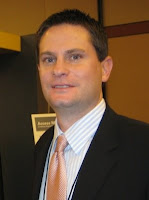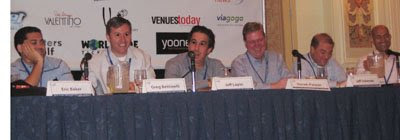Understanding the difference between today’s biggest firmsBy Dave Brooks
Venues Today - April IssueREPORTING FROM LONG BEACH, CALIF. — It was the perfect puzzle for the 100 or so ticketing experts who had gathered at Tickets.com’s Executive Summary last February.
After five stellar, mostly sell-out seasons, the perennial Phoenix Suns found themselves in a bit a slump in the National Basketball Association. As John Walker, team VP of Business Development, explained, 2009 was the year the team traded away star Shaquille O’Neal and missed the playoffs. Renewal rates dipped from the high 90s to 60 percent at the beginning of the 2010/2011 season, and Walker realized he had a problem on his hands.
“Suddenly, I’m looking at 3,000 to 5,000 tickets per night that I had to sell, and some of these games were going to be difficult at their current price,” Walker said before the audience gathered for the presentation on Market Ticket Pricing he had been commissioned to moderate.
“I really don’t want to piss off season ticket holders by lowering prices on low demand tickets, but I will still have the high demand games as well. Whenever the Lakers come to town, the price of the tickets double and even triple, and there are plenty of people who will still pay for it.”
Walker said he will dynamically price his tickets for next season under a few simple principals. Low demand games will be priced cheaper — this will give the season ticket holder a little breathing space on resale. For more expensive seats, he will raise the value of the ticket.
For season ticket holders, the cost of season tickets won’t change much, since the lower priced tickets will offset the cost of the higher priced tickets in the package.
Had he just engaged in dynamic pricing? Perhaps, in its simplest form. The practice was a hot topic at this year’s International Ticketing Association (INTIX) conference and set the stage for a healthy discussion at Executive Summit.
But just what exactly does it mean to dynamically price one’s tickets? Is it simply a matter of more correctly pricing tickets for high and low demand games, or does it mean bringing on a software provider like Qcue to crunch the numbers to constantly find the most up-to-date prices?
Or does it mean bringing on a firm with industry staples like Harry Sandler of Digonex, a former Frontline Management executive, who helped bands like The Eagles make huge gains on their ticketing software?
In the next 12 to 24 months, ticketing professionals will continue to have new options for dynamically pricing their tickets: either on their own, or with a technology partner. Venues Today sat down with some of the industry’s top professionals to discuss their options.
WORKING WITH YOUR TICKETING PROVIDERA dynamic pricing system is only as good as your ticketing company allows it to be.
“Our approach is really about partnering and technology enablement for all of our customers,” said
Chief Commercial Officer Derek Palmer of Tickets.com “We’ve been involved with Qcue for several years and have worked with the San Francisco Giants and the Dallas Stars to find a way to add data to the algorithms that Qcue uses, which then provides pricing statistics and pricing recommendations that get placed back into the ticketing system,” Palmer said. “Our company could do the exact same integration with Digonex, although we’re not currently doing it.”
Palmer said the model for
Tickets.com is to leave the dynamic pricing question to the client and integrate with the system the client chooses — some systems work better for concerts, while other’s are optimized for sports.
“The main thing as an organization is that you have to make a philosophical decision that this is something you want to implement,” Palmer said. “There will be serious changes, and once you’ve philosophically readied yourself, you bring in the folks who can help you in what you are trying to achieve.”
Palmer said technology should not be a buy-before-you-try proposition, especially when that technology affects serious revenue generators like ticket sales. There are a lot of incentives for early adopters to try out dynamic pricing solutions. Digonex said it offered several free trials of its system during its early phases.
“Organizations gain better intelligence to price their tickets more accurately the first time. This data that Digonex and Qcue bring to bear certainly helps any organization do that. Prior to these two organizations, teams had to mostly rely on historical data, in a more trial and error process,” Palmer said.
Using a dynamic pricing system allows you “to get a lot more elasticity from the ticket price and get closer to what true demand will actually pay,” he said.
QCUE CONTINUES FORWARDCreated by Barry Kahn and a team of economics grad students at the University of Texas,
Qcue has gone from being a business contest winner to a major player in the dynamic ticketing space.
At 29, Kahn has helped his company usher in a number of venture capital infusions and state grants. He counts among his clients the San Francisco Giants and the Dallas Stars, along with a number of baseball teams which have yet to publicize their relationship with Qcue.
“There are certain teams out there who don’t want to make a big deal of the fact that they need help better pricing their tickets,” he said.
In his first year with the Giants, Qcue helped the team accurately price about five percent of the seats in the stadium, a move that led to an increase of $500,000 in year-over-year revenue for that same section. In 2010, Qcue will price the entire ballpark, all 41,503 seats, and Kahn said he expects an incremental uptick in team revenue.
“When you realize that season ticket holders occupy half of their stadium, it becomes apparent that we’re working with 10 times the inventory this year. I don’t think it’s unrealistic to expect a proportional increase of incremental revenue,” he said. “This is a multi-million dollar proposition to teams. Whether that is $1 million-$2 million or $5 million-$10 millions depends a lot on the team.”
Kahn charges subscription fees and a revenue sharing model for Qcue software, which is delivered to the customer via a web-application. After logging in, users are given access to a pricing dashboard, which provides real-time pricing recommendations for upcoming games, broken out by seating section. A ticketing professional can simply click to accept Qcue’s recommendations, or adjust one of the systems many pricing variables to bring prices up or down. Maybe the starting pitcher will draw more fans than the system recognizes. Maybe a once lousy opponent has heated up with a new trade or talent signing, and demand for the ticket could spike at any minute. The system gives box office professionals the ability to tweak Qcue’s algorithm and boost revenues.
“We created a map that allows teams to get more out of their ticketing systems,” Kahn said.
DIGONEX MAKES AN ENTRANCEThe
Digonex team, led by Sandler and CEO Jim Eglen, made a splash in February when the Cleveland-based firm signed the Cleveland Cavaliers as the first team in the National Basketball Association to bring in an outside variable pricing consultant to help set their prices for the second half of the 2009/2010 season.
“In some reality, what the Cavs have within their Flash Seats component and the Veritix system is ideal for dynamic pricing and it seems like the logical place to start,” said Handler.
Elgen describes Digonex as a market-driven system that doesn’t use forecasting or predictive analytics as the primary driving force of their core technology, but instead looks at market conditions. The company has its own software platform, but works with venue clients in more of a consulting role, helping teams set prices in advance and on the fly.
“We’ve got a smart pricing solution and it learns as it goes,” Eglen said.
Digonex comes to the table stacked with big names. Eglen’s brother Jeff is a former partner at global management giant Accenture. Mike Wanchic, music director and band leader for John Mellencamp, will serve as VP of Digital.
“We’ve got about 25 people and everyone does what they have to to get the job done,” Eglen said.






